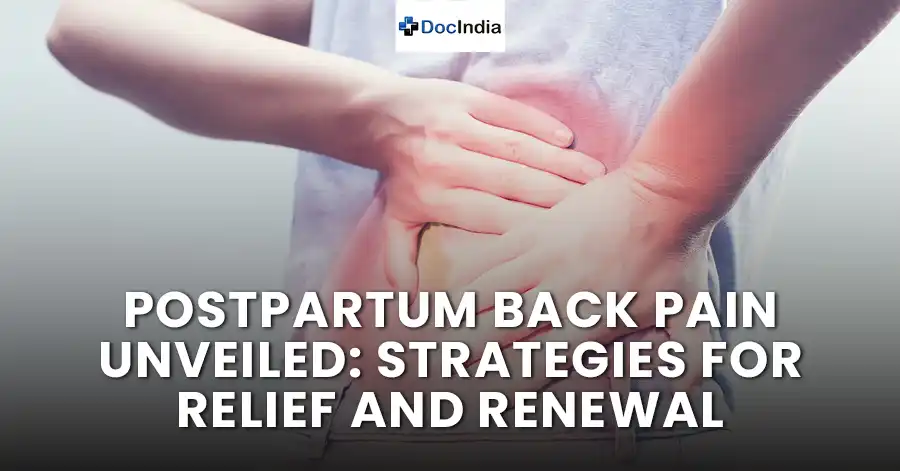Postpartum Back Pain Unveiled: Strategies for Relief and Renewal

Postpartum Back Pain: Why It Happens And What You Can Do For Relief
Bringing a new life into the world is a profound and joyous experience. However, the journey through pregnancy and childbirth can bring about various physical changes, some of which lead to postpartum back pain—a challenge faced by many new mothers. This discomfort, ranging from mild to severe, can affect daily life and hinder the joys of early parenthood. Understanding the causes and exploring relief options is crucial for managing and alleviating postpartum back pain.
Why Postpartum Back Pain Occurs
1. Hormonal Changes:
During pregnancy, the body produces hormones like relaxin that loosen ligaments and joints to prepare for childbirth. While this is essential for the birthing process, it can also contribute to instability and strain on the lower back.
2. Changes in Posture:
The weight gain and changes in the body's center of gravity during pregnancy can alter posture, leading to increased stress on the back muscles.
3. Muscle Strain:
The physical demands of labor, as well as the strain of carrying and caring for a newborn, can lead to muscle strain and fatigue in the back and surrounding areas.
4. Epidural or Spinal Block:
Some women opt for pain relief methods like an epidural or spinal block during labor, which can cause temporary soreness or backaches after delivery.
5. Cesarean Section:
For women who undergo a C-section, the incision and recovery process can also contribute to back pain due to changes in abdominal muscles and altered movement patterns during recovery.
Relief Measures for Postpartum Back Pain
1. Proper Posture and Body Mechanics:
Maintaining good posture while feeding, lifting the baby, or performing daily activities can alleviate strain on the back. Using supportive chairs and pillows while nursing or holding the baby can also help.
2. Gentle Exercise:
Gradual re-introduction of exercise, particularly exercises focusing on core strength and flexibility, can aid in relieving back pain. Consultation with a healthcare professional before starting any postpartum exercise regimen is advisable.
3. Physical Therapy:
Seeking guidance from a physical therapist can be immensely beneficial. They can provide exercises, stretches, and techniques to strengthen core muscles and improve posture.
4. Pain Management Techniques:
Heat or cold packs applied to the affected area can provide relief from discomfort. Additionally, over-the-counter pain relievers approved by a healthcare provider may be used.
5. Supportive Devices:
Utilizing devices like supportive belts or wraps can offer additional support to the lower back, easing strain during daily activities.
6. Massage and Alternative Therapies:
Massage therapy or alternative therapies like acupuncture can help relax muscles and alleviate tension in the back.
7. Rest and Self-Care:
Ensuring adequate rest and self-care is crucial for recovery. Simple practices like taking short breaks, practicing relaxation techniques, and prioritizing sleep can aid in reducing back pain.
8. Seeking Professional Help:
If back pain persists or worsens, consulting a healthcare provider is essential to rule out any underlying issues and explore further treatment options.
Lifestyle Changes for Prevention and Long-Term Management
1. Ergonomic Adjustments:
Making ergonomic adjustments at home, such as using supportive chairs or adjusting the height of changing tables, can reduce strain on the back during daily activities.
2. Weight Management:
Maintaining a healthy weight post-pregnancy can alleviate stress on the back and prevent additional strain.
3. Proper Lifting Techniques:
Learning and practicing proper lifting techniques, especially when handling the baby or heavy objects, can prevent back injuries.
4. Hydration and Nutrition:
Adequate hydration and a balanced diet rich in nutrients and vitamins can promote overall health and aid in recovery.
5. Emotional Support:
Seeking emotional support and discussing concerns with loved ones or joining support groups for new mothers can alleviate stress, which often exacerbates physical discomfort.
When to Seek Medical Advice
While postpartum back pain is common, there are instances where it may indicate an underlying issue that requires medical attention. If any of the following symptoms accompany back pain, prompt consultation with a healthcare provider is recommended:
- Fever
- Numbness or tingling in the legs
- Severe or persistent pain
- Pain accompanied by bladder or bowel dysfunction
Postpartum back pain is a common concern for many new mothers, but it is not a permanent state. Understanding the causes and adopting proactive measures for relief and prevention can significantly improve one's quality of life during this transformative period. Embracing a combination of lifestyle adjustments, exercise, proper posture, and seeking professional guidance when needed empowers new mothers to navigate this phase with less discomfort, allowing them to focus on the joyous moments of parenthood. Remember, every woman's journey is unique, so finding the right approach that suits individual needs is key to finding relief from postpartum back pain.
